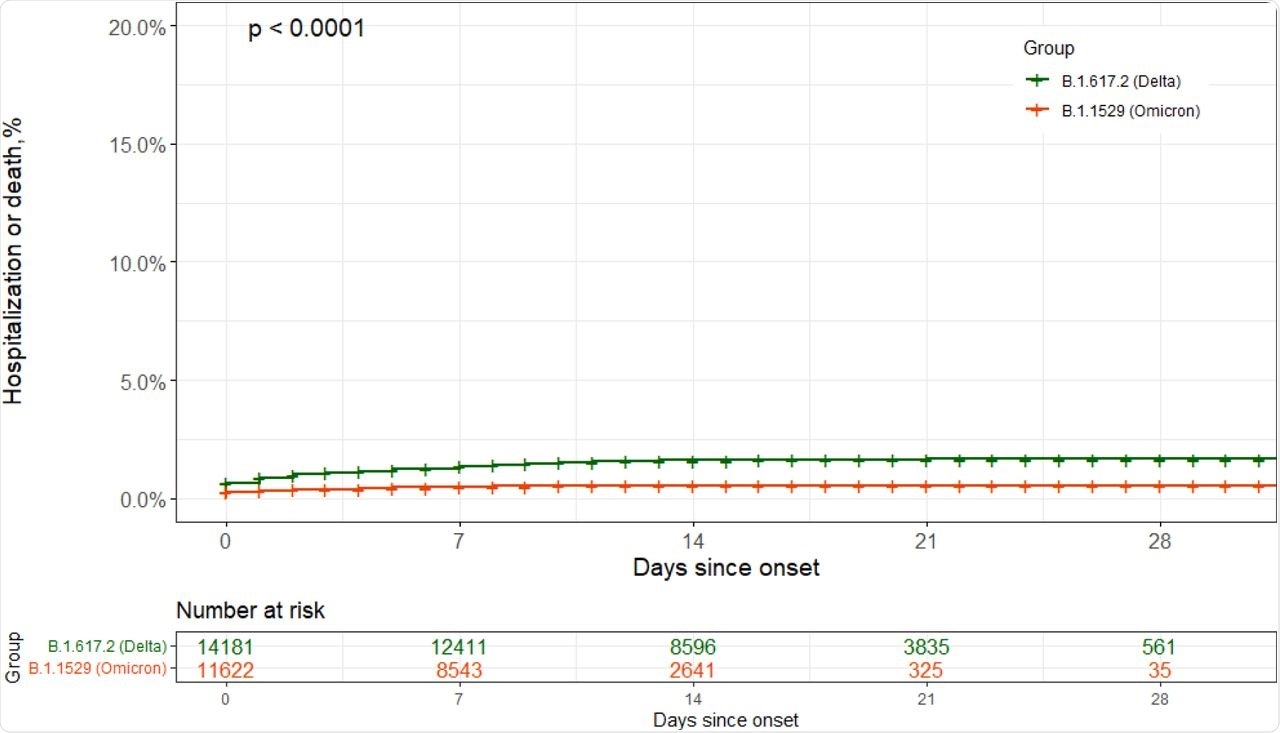In late November 2021, the severe acute respiratory syndrome coronavirus 2 (SARS-CoV-2) Omicron variant of concern was first reported in South Africa.
Since its original identification, researchers have sequenced the genome of the Omicron variant and found that it contains more than 30 mutations in the spike protein. The presence of these mutations is likely the reason for its rapid spread and subsequent dominance over the prior SARS-CoV-2 Delta variant in most affected countries around the world.
The severity of Omicron cases continues to remain debatable. Early data from South Africa suggests that Omicron may cause milder disease as compared to other strains of SARS-CoV-2. However, the low average age of the patient, extent of the previous infection, and low vaccination rates impact the generalizability of the condition in other countries.
.jpg) Study: Early estimates of SARS-CoV-2 Omicron variant severity based on a matched cohort study, Ontario, Canada. Image Credit: sfam_photo / Shutterstock.com
Study: Early estimates of SARS-CoV-2 Omicron variant severity based on a matched cohort study, Ontario, Canada. Image Credit: sfam_photo / Shutterstock.com
In a recent study published on the preprint server medRxiv*, researchers evaluate the rates of hospitalization and deaths associated with patients infected with the SARS-CoV-2 Omicron variant as compared to those infected with the Delta variant.
About the study
The researchers conducted a retrospective population-wide matched cohort study of patients infected with both the SARS-CoV-2 Omicron and Delta variants. To this end, data from Ontario’s Public Health Case and Contact Management Solution (CCM), which had details of all cases diagnosed with SARS-CoV-2 infections, was used in the current study. These cases are linked to the Ontario Ministry of Health’s COVaxON application, with all relevant vaccination records in the province.
Cases were included in the current study if the onset of disease occurred between November 22, 2021, and December 17, 2021, based on the date of the first case of Omicron being reported in Ontario. The date of disease onset was defined by the date of appearance of symptoms or the date of specimen collection for asymptomatic cases.
Exclusion criteria for the study were missing onset date, age, or sex information, as well as cases of hospital-acquired infections. The samples with the Omicron variant included those identified by whole-genome sequencing (WGS), S-gene target failure (SGTF) with cycle threshold (CT) values less than or equal to 30 before December 13, 2021. Cases with the Delta variant were also detected by WGS and amplification of the S-gene.
Study findings
A total of 6,314 cases of Omicron cases met the eligibility criteria, out of which 6,312 were matched with at least one Delta case out of a total population of 8,875 based on age, gender, and onset date. Twenty-one (0.3%) hospitalizations and zero deaths among matched Omicron cases were reported, which was compared to 116 (2.2%) hospitalizations and seven (0.3%) deaths among matched Delta cases.
The risk of hospitalization or death was 68% lower in cases with Omicron infection as compared to Delta cases. After adjusting for vaccination status, the risk of hospitalization or death was 54% lower in Omicron-infected patients.
 SARS-CoV-2 associated hospitalization or death among matched Omicron variant (N=11,622, orange line) and Delta variant cases (N=14,181, green line) cases as a function of days since onset. Date of onset was defined as symptom onset date, falling back to first positive specimen collection date in the absence of a documented symptom onset date.
SARS-CoV-2 associated hospitalization or death among matched Omicron variant (N=11,622, orange line) and Delta variant cases (N=14,181, green line) cases as a function of days since onset. Date of onset was defined as symptom onset date, falling back to first positive specimen collection date in the absence of a documented symptom onset date.
Implications
The study findings aligned with early-stage data from countries like England, Scotland, and South Africa, wherein the Omicron variant was found to cause less severe infections with significantly lower cases of severe disease, hospitalizations, and deaths. This data can be used to spread awareness regarding recent trends of the disease and prevent panic among the general population.
One early hypothesis by scientists for the increased transmissibility and reduced severity of the Omicron variant is the increased replication in the bronchi but decreased replication in the lung parenchyma. These findings may also contribute to early evidence demonstrating that the coronavirus disease 2019 (COVID-19) might be headed towards a milder form and that SARS-CoV-2 may become endemic if the variants continue to cause mild disease.
*Important notice
medRxiv publishes preliminary scientific reports that are not peer-reviewed and, therefore, should not be regarded as conclusive, guide clinical practice/health-related behavior, or treated as established information.
- Ulloa, A. C., Buchan, S. A., Daneman, N., & Brown, K. A. (2021). Early estimates of SARS-CoV-2 Omicron variant severity based on a matched cohort study, Ontario, Canada. medRxiv. doi:10.1101/2021.12.24.21268382. https://www.medrxiv.org/content/10.1101/2021.12.24.21268382v2.
Posted in: Medical Science News | Medical Research News | Medical Condition News | Disease/Infection News | Healthcare News
Tags: Bronchi, Coronavirus, Coronavirus Disease COVID-19, covid-19, CT, Gene, Genome, Hospital, Omicron, Protein, Public Health, Respiratory, SARS, SARS-CoV-2, Severe Acute Respiratory, Severe Acute Respiratory Syndrome, Spike Protein, Syndrome

Written by
Sreetama Dutt
Sreetama Dutt has completed her B.Tech. in Biotechnology from SRM University in Chennai, India and holds an M.Sc. in Medical Microbiology from the University of Manchester, UK. Initially decided upon building her career in laboratory-based research, medical writing and communications happened to catch her when she least expected it. Of course, nothing is a coincidence.
Source: Read Full Article
